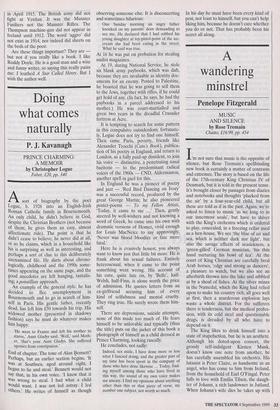Doing what comes naturally
P. J. Kavanagh
PRINCE CHARMING: A MEMOIR by Christopher Logue Faber, £20, pp. 340 Asort of biography by the poet Logue, b. 1926 into an English-Irish Roman Catholic family in Bournemouth. An only child, he didn't believe in God, despite the Christian Brothers (not because of them; he gives them an easy, almost affectionate ride). The point is that he. didn't cease to believe; he never did at all,' or so he claims, which in a household like his is surprising as well as interesting, and perhaps a sort of clue to this deliberately unexamined life. He darts about chrono- logically, childhood and the 1990s some- times appearing on the same page, and the good anecdotes are left hanging, tantalis- ing; a pointilliste approach. An example of the general style: he has decided to flee unemployment in Bournemouth and to go in search of him- self in Paris. His gentle father, recently dead, has left him £50 towards his trip. His widowed mother (presented in shadowy fashion) says he must do whatever makes him happy: `He went to France and left his mother to starve,' Aunt Gladys said. 'Well,' said Moth- er, 'that's your Aunt Gladys. She suffered agonies from constipation.'
End of chapter. The tone of Alan Bennett? Perhaps, but an earlier section begins, 'It was at Southsea, aged around eight, I began to lie and steal.' Bennett would not say that, in his own voice. knew that it was wrong to steal. I had what a child would want. I was not led astray. I led others.' He writes of himself as though observing someone else. It is disconcerting and sometimes hilarious:
One Sunday morning an angry father knocked on my parents' door demanding to see me. He declared that I had robbed his young daughter at toy-pistol-point of the ice- cream she had been eating in the street. What he said was true.
At 16 he was put on probation for stealing nudist magazines.
At 19, during National Service, he stole six blank army paybooks, which was daft, because they are invaluable as identity doc- uments for an enemy. Posted to Palestine, he boasted that he was going to sell them to the Jews, together with rifles, if he could get hold of any. (In fact, he says, he had the paybooks in a parcel addressed to his mother.) He was court-martialled and given two years in the dreadful Crusader fortress at Acre.
It is tempting to search for some pattern in this compulsive outsiderdom; fortunate- ly, Logue does not try to find one himself. Then came Paris, poverty, friends like Alexander Trocchi (Cain's Book), publica- tion of his poetry in England, and return to London, as a fully paid-up dissident, to join his voice — distinctive, a penetrating nasal baritone — to the predominant radical voices of the 1960s — CND, Aldermaston, another spell in gaol for this.
In England he was a pioneer of poetry and jazz — 'Red Bird Dancing on Ivory' was a successful record, produced by the great George Martin; he also pioneered poster-poems — To my Fellow Artists, `Today, it came to me ...' Then, gently steered by well-wishers and not knowing a word of Greek, he came into his own with dramatic versions of Homer, vivid enough for Louis MacNeice to say approvingly, `Never was blood bloodier or fate more fatal.'
Here he is evasively honest, you always want to know just that little bit more. He is frank about his sexual failures. Entirely heterosexual, when it came to the point something went wrong. His account of his cure, quite late on, by 'Belle', half- Welsh, half-Finn, is alone worth the price of admission. He quotes letters from an ex-girlfriend accusing him of every kind of selfishness and mental cruelty. They ring true. He surely wrote them him- self.
There are depressions, suicide attempts, none of this made too much of. He fears himself to be unlovable and typically (thus the title) puts on the jacket of this book a photograph of himself as a child dressed as Prince Charming, looking rascally.
He concludes, not sadly: Indeed, sex aside, I have done more or less what I fancied doing, and the greater part of my time has been spent in the company of those who have done likewise ... Today, find- ing myself among those who have lived in this way, the sound of my own voice makes me uneasy. I find my opinions about anything other than this or that piece of verse, my number one subject, not worth so much. In his day he must have been every kind of pest, not least to himself, but you can't help liking him, because he doesn't care whether you do or not. That has probably been his secret all along.


























































 Previous page
Previous page